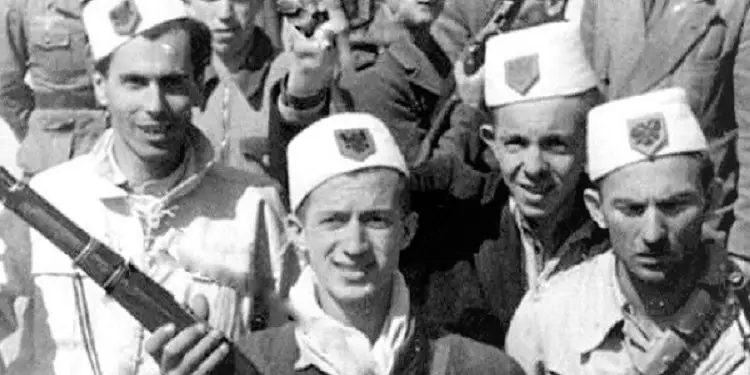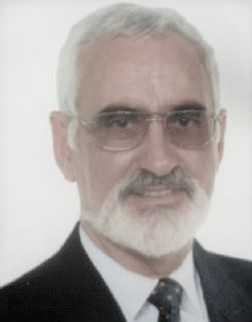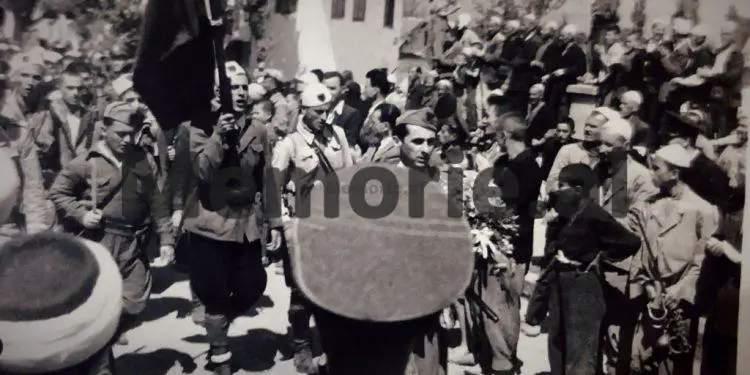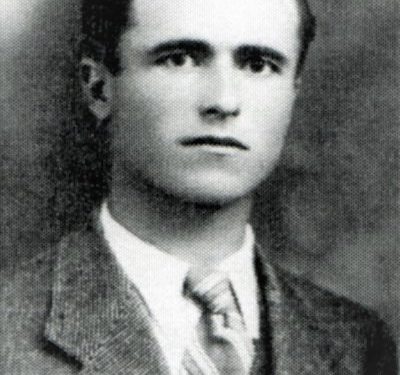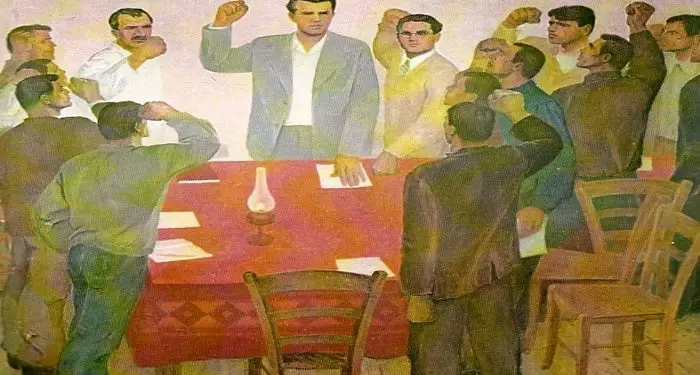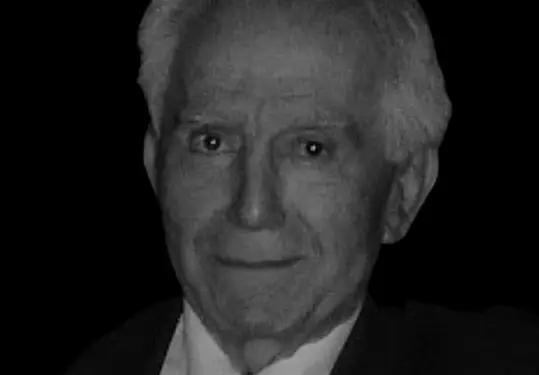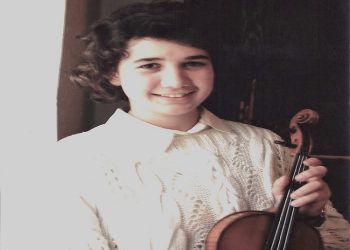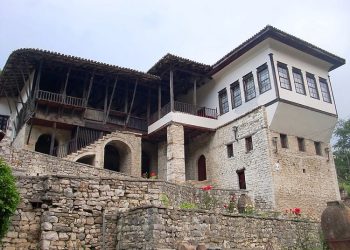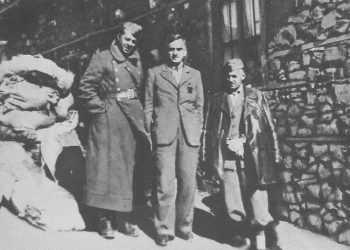From Prof. Assoc. Dr. Thanas L. Gjika
– THREE LESSONS FROM THE LIFE OF 90-YEAR-OLD SEJFI PROTOPAPA –
Memorie.al / A few years ago in Tirana, a series of interviews were published with the Albanian-American patriot, Sejfi Protopapa. Having known him for 17 years here in the USA, as a patriot and collaborator of the unforgettable Antoni Athanas, as an active activist for the autocephaly of the Albanian Orthodox Church, a few months ago, I gathered some memories to celebrate the 90th anniversary with a group of intellectuals in Worcester, MA. From Mr. Protopapa’s memories and from his interviews, published in recent years, I have derived three very valuable lessons for all of us Albanians:
- From evil, we must separate ourselves immediately and definitively.
Sejfi Estref Protopapa left his homeland in November 1944, as one of the cadres of the ‘National Front’, as one of the undesirable persons of the Albanian Communist Party because he had made public Enver Hoxha’s secret directive dated September 10, 1943, in which he instructed party organizations in the regions of Albania to begin the war against the ‘National Front’, labeling it as the cause of division and fratricide…!
“I, along with my cousin Dituria,” Sejfi recounts, “after we finished our studies in Italy in June 1943, returned to Berat, with the great desire to participate with arms in the Anti-Fascist war. My father was old and did not engage in politics, he remained neutral; while my uncle, although not a member of the ‘National Front’, was a supporter of this organization because he valued the leaders of the ‘Front’ for their education and known patriotism.
Faced with pressure from the communist youth, Dituria and I agreed to join them, to show that we were not pro-fascists, but anti-fascist patriots who wanted to fight the occupier. Dituria joined the armed forces and went to the mountains as a partisan, while I, being disabled, was not sent to the mountains, but was kept in the city to work as a secretary and typist in the Prefecture, where activists of the PKSH (Albanian Communist Party) were placed. Among the young people I started collaborating with to type and duplicate PKSH materials were Kristaq and Margarita Tutulani, whom I knew and sympathized with as intelligent and patriotic people.
Margarita, who was also quite beautiful, had been my classmate in city school. Kristaq dictated some of his writings to me while at other times he brought in leaflets from the center. Our collaboration continued for almost a month until the forces of the Italian carabinieri (under King Victor Emmanuel III) carried out a cleansing operation in July 1943, arresting and killing 30 young anti-fascists from Berat, most of whom were communists, including Margarita and Kristaq.
I was terrified and did not go to the Prefecture for several days, waiting to be arrested. But after a few days, they informed me to go back to the Prefecture. I was not a member of the PKSH, nor even a candidate, I simply worked as a secretary, typist, and typographer, multiplying the materials that came from the center.
Around September 12-13, 1943, the postman brought and left an envelope in the office where I was. Since he did not say it was secret material and since my boss was not there, I, thinking that the material should be copied and multiplied for distribution as soon as possible, opened the envelope and read the material. It was a secret directive signed by “Shpati”. Among other things, these words have stuck in my mind:
…we must work in the direction that follows: To unmask and discredit the ‘National Front’ among the people, to present the ‘National Front’ to the people as divisive and the cause of fratricide. We need to make the people… revolt, and thus all historical responsibility for the division of the Albanian people and the armed struggle falls on the ‘National Front’”.
(This fragment has been verified with the material; From the secret directive of Enver Hoxha, sent on September 10, 1943, to all the regional committees of the PKSH, published in the work “Albania at War”, author Prof. Dr. Muharrem Dezhgiu, Tirana, ‘GLOBUS R’. 2001, p. 334. Our note, Th. L. Gj.)
“Reading this material shocked me,” continues Mr. Protopapa. “Until that day, there existed an atmosphere of mutual understanding and cooperation between the Communist Party and the ‘National Front’. The decisions made in Mukje on August 2, 1943, for a joint fight for the liberation of the homeland and for holding free elections after the war, to let the people choose the regime they desired, had filled the entire population, especially us anti-fascist activists, with optimistic hopes.
However, unexpectedly ‘Shpati’ (Enver Hoxha) was instructing that efforts should be made to discredit the ‘National Front’, labeling it as divisive and the cause of fratricide at a time when a fratricidal war did not exist. I thought to myself that the PKSH aimed to create a fratricidal war and place the blame on the ‘National Front’ to eliminate it as a rival for power.
Shocked, I put the material in an envelope and into my pocket, and went home. After reading it, my father told me: Go to Veliu. He asked me to deliver it to Abas Ermenji, the chairman of the ‘National Front’ for the Berat district. I went to the Municipality, where the activists of the ‘Front’ were settled and worked, and I handed over the envelope to Mr. Ermenji.
He thanked me and instructed that it be copied and published as soon as possible in the newspaper ‘FLAMURI’, the organ of the ‘National Front’. After this, I did not go back to the Prefecture, and I even left Berat, going for a few days to the village of Protopapë to meet my relatives there. I used to go to Protopapë during summer vacations, as my father would send me there when I was a student in city school.
I thought about joining the mountains as a ballist, but my cousins there were affiliated with the partisan movement. After explaining to them the reasons why I did not want to work for the Communist Party anymore, I returned to Berat. I intended not to join any political force and to focus on my own work, remaining neutral.
However, one afternoon, when I had my father on the back of the bicycle to take him home from the café for lunch, not far from the Prefecture, Ceno Vermishi cut me off. He stopped me, placing his hand on the handlebars and tightening a rifle he held in his other arm, and said in a decidedly unfriendly tone: ‘Sejfi, why haven’t you left the Prefecture? Come on, we need you!’
My father, realizing the threat, angrily told him: ‘Hey boy, just because you have a gun slung over your shoulder, you think you’ve become a man and can block our way. Leave us alone; we are going home to eat lunch; you can meet Sejfi later.’ I did not go to the Prefecture, but instead went to the Municipality, where I met Mr. Ermenji and told him about the threat made by Ceno Vermishi. He understood that the communists wanted to physically eliminate me, as the person who had made the secret directive of Enver Hoxha public. He provided me with two armed men to protect me in any situation: his younger brother, Zeno Ermenji, and a brave man from Moglicë of Korçë, Selim Moglicën. After a few days, I decided to leave Berat.”
“Abaz Ermenji entrusted me a large unit, a battalion, with 150 armed nationalists to operate in the Roskovec area. Our goal was to maintain order and tranquility; we did not organize any armed engagements against the partisans, nor against the Germans. The Germans were stationed in Kuçovë and Ura Vajgurore. Their goal was to exploit the oil and maintain the roads. In total, the Germans brought two divisions with very young boys and elderly men to Albania. Neither the partisan forces nor we nationalists engaged in real battles against them…!”
From this testimony of Mr. Protopapa and from the materials published in recent years about World War II in Albania, it is clear that after the rejection of the Mukje decisions and the declaration of the ‘National Front’ as an enemy organization by the leadership of the PKSH, the National Liberation Anti-Fascist War also took on the characteristics of a civil fratricidal war.
When the nationalist formations saw that the partisan gun was directed against them, they became disoriented. There were also nationalist formations that made the same mistake and began to carry out military actions against the partisan forces, and some of them even collaborated with the German forces.
Therefore, it must be accepted that the war took on the characteristics of a civil war, a war to secure power, before the liberation of the homeland was achieved, but for this phenomenon, the ‘National Front’ should not be solely blamed, as has been the case until now, since the primary cause of it was Enver Hoxha’s secret directive, which was immediately made public by the clever and courageous young man, Sejfi Protopapa.
This action of this 20-year-old, who knew how to properly assess Enver Hoxha’s secret directive as an anti-national act that incited the Anti-Fascist War to turn into a fratricidal war, a war for power, carries within it the great lesson: from evil, we must separate ourselves without hesitation and definitively.
However, most of our historians, even today, do not accept the fact that ultimately the ‘National Front’ made a mistake, since it was the partisan gun that pushed them into that mistake, and the responsibility for distorting the War after September 1943 primarily falls on the leadership of the PKSH because it initially took the first wrong step.
Unfortunately, this blame of the PKSH has been denied by historians and pro-communist pensioners, and they continue to deny it. They continue to label the ‘National Front’ as a treasonous organization, and the nationalists who fell as martyrs in the battles against the Italian fascist forces and the Germans have not been allowed to be buried in the Martyrs’ Cemetery.
- The authors of the works of socialist realism should condemn their artistic crimes.”
“For the publication of the secret directive, Sejfi Protopapa was anathematized by the Albanian Communist Party, was placed on the lists of enemies of the people, and through the art of socialist realism, he became a negative figure, through the character of the nationalist named Sali Protopapa, created by the writer Dritëro Agolli, in the novel ‘Komisari Memo’, which was also made into a film titled ‘The Eighth in Bronze’.
In 1992, during his first visit to Albania, Mr. Sejfi Protopapa went to the home of the writer Dritëro Agolli to see if, after the collapse of the dictatorship, he had evolved and understood the damage caused by the extreme politicization of his works.
During the conversation, Mr. Protopapa told the writer that he, as a nationalist, had not killed any Albanians and had not collaborated with the German occupiers, and that his only “fault,” which the PKSH / PPSH could not forgive him for, was the denunciation and publication of Enver Hoxha’s secret directive of September 10, 1943. However, the writer did not ask for forgiveness for the distortions he had fabricated, but while laughing told him that the choice of the character’s name was coincidental.
Furthermore, the former nationalist told the writer that after the screening of the film and the publication of the novel, his family members in Albania began to be looked upon more harshly than before, and they, in order to escape the consequences of class struggle, changed their surname. Again, the writer did not express any regret.
This conversation clearly showed that Dritëro Agolli, one of the most talented writers of the literature of the dictatorship era, had not taken any steps toward repentance, nor any steps toward evolution, to denounce the extreme politicization of his works, drafted in accordance with the norms of the method of socialist realism.
Unfortunately, Dritëro Agolli is referred to by pro-communist writers as the “Patriarch of Albanian Letters,” and he does not revolt, does not consider it an insult, but takes pride in such an epithet, an epithet that has not been given to Gjon Buzuku, Pjetër Bogdani, Jeronim De Rada, Naim Frashëri, Gjergj Fishta, etc. Therefore, Dritëroi took pride in being called “the master, the chief craftsman of Albanian socialist realism,” unwilling to understand that the majority of his works and those of his colleagues constitute the “artistic crime” of the dictatorship era.
From the meeting between Mr. Protopapa and Agolli, we should draw the second lesson: The majority of creators of the dictatorship era, who are still alive, have not worked diligently on their renewal, on their de-politicization, to free themselves from the communist mentality, this bloodstain on their brains…!
The autocephaly of the Albanian Orthodox Church is a national cause that must be defended also by Muslim Albanians.”
“Immediately after the collapse of the communist dictatorship, Sejfi Protopapa became engaged in the fight for the protection of the Autocephaly of the Albanian Orthodox Church. He joined Mr. Antoni Athanas, Very Rev. Arthur Liolin, and others, and went to Albania to defend the Autocephaly of the Albanian Orthodox Church.
He wrote various articles on this issue and invested in ordaining Albanian Orthodox priests in Romania, Macedonia, and here in America, priests who work independently, under His Grace, Janullatos.
In this regard, Protopapa worked in accordance with the path envisioned by Sami Frashëri, who, when he first raised the issue of the Autocephaly of the Albanian Orthodox Church as a matter of national importance, said that this should be accomplished together by Christian Albanians in cooperation with Muslim Albanians…! Memorie.al”
If you need any further assistance or additional translations, feel free to ask!/ “Immediately after the collapse of the communist dictatorship, Sejfi Protopapa became engaged in the fight for the protection of the Autocephaly of the Albanian Orthodox Church. He joined Mr. Antoni Athanas, Very Rev. Arthur Liolin, and others, and went to Albania to defend the Autocephaly of the Albanian Orthodox Church.
He wrote various articles on this issue and invested in ordaining Albanian Orthodox priests in Romania, Macedonia, and here in America, priests who work independently, under His Grace, Janullatos.
In this regard, Protopapa worked in accordance with the path envisioned by Sami Frashëri, who, when he first raised the issue of the Autocephaly of the Albanian Orthodox Church as a matter of national importance, said that this should be accomplished together by Christian Albanians in cooperation with Muslim Albanians…! Memorie.al”
If you need any further assistance or additional translations, feel free to ask!/ Memorie.al




